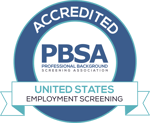.jpg?width=1000&height=896&name=Compliance%20(2).jpg)
The beginning of the year is a great time to ensure you are following all Compliance Standards in your background screening process. Over the next few weeks, we will be hitting on all of the key components to maintain FCRA compliance.
What is the FCRA?
The FCRA of Fair Credit Report Act is a federal law regulating the collection and reporting of an individual’s background information. A CRA (consumer reporting agency) and employer both have obligations under the FCRA. It also protects the consumer with provisions like consent must be obtained, the consumer has a right to receive their report, the consumer has a right to dispute information, etc. For more information reference the FCRA here.
The employer cannot delegate responsibility for compliance of the FCRA to a CRA, nor can they claim they did not realize they were in violation of FCRA. This means an employer must take responsibility for compliance. This means saying you did not realize you were violating it will not be a defense in doing so (i.e., a strict-liability statute).
FCRA Employer Requirements and Future Topics
The Summary of Rights Notice: A Summary of Rights Notice as Required by the FCRA is a summary of the consumer’s rights as it applies to background screening. Consumers must receive a copy of the FCRA Summary of Rights. Additional state and local summaries may be required.
Consent Form: Under the FCRA, employers must get permission to run a background check from the subject of the report before initiating the request. This is accomplished through obtaining a signed Consent Form, also referred to as an Authorization and Disclosure Form.
Adverse Action: If you make a decision that negatively impacts the subject of the background report, based all or in part on the results of the report, you must follow the adverse action process. According to the FCRA, this includes Pre-Adverse Action, Waiting Period, Post-Adverse Action.
Copy of Report: The FCRA ensures the right of a consumer to see a copy of their report when requested; there is no lawful cause to refuse the request. The FCRA uses this provision to encourage transparency. In doing so, it allows the consumer to identify and dispute inaccuracies – regardless of whether these influenced your decision.
Dispute: Any information that is identified as inaccurate can be disputed with the agency running the background check. Similar to providing a copy of the report, there is no lawful cause to deny the subject of the report their right to dispute.
When a dispute is submitted, Choice Screening will verify the information being disputed with the original source. Upon conclusion, you and the applicant or employee will be notified that either the original report was confirmed or that it was updated according to our researcher’s findings.
Security & Privacy: The FCRA obliges users and providers of background reports to ensure adequate security so that personal information about the consumer cannot fall into the wrong hands.
Do you still have questions? Contact Us or Subscribe to our Blog and stay informed!
This communication is intended for Choice Screening's current or prospective clients and partners and may not be forwarded outside of Choice Screening, posted online, or otherwise reprinted in whole or in part.
The information contained in this newsletter is not all encompassing and is meant to be informative only, nor contains legal advice, expressed or implied. Consult with qualified legal counsel in all matters of employment, business, and background screening law.


